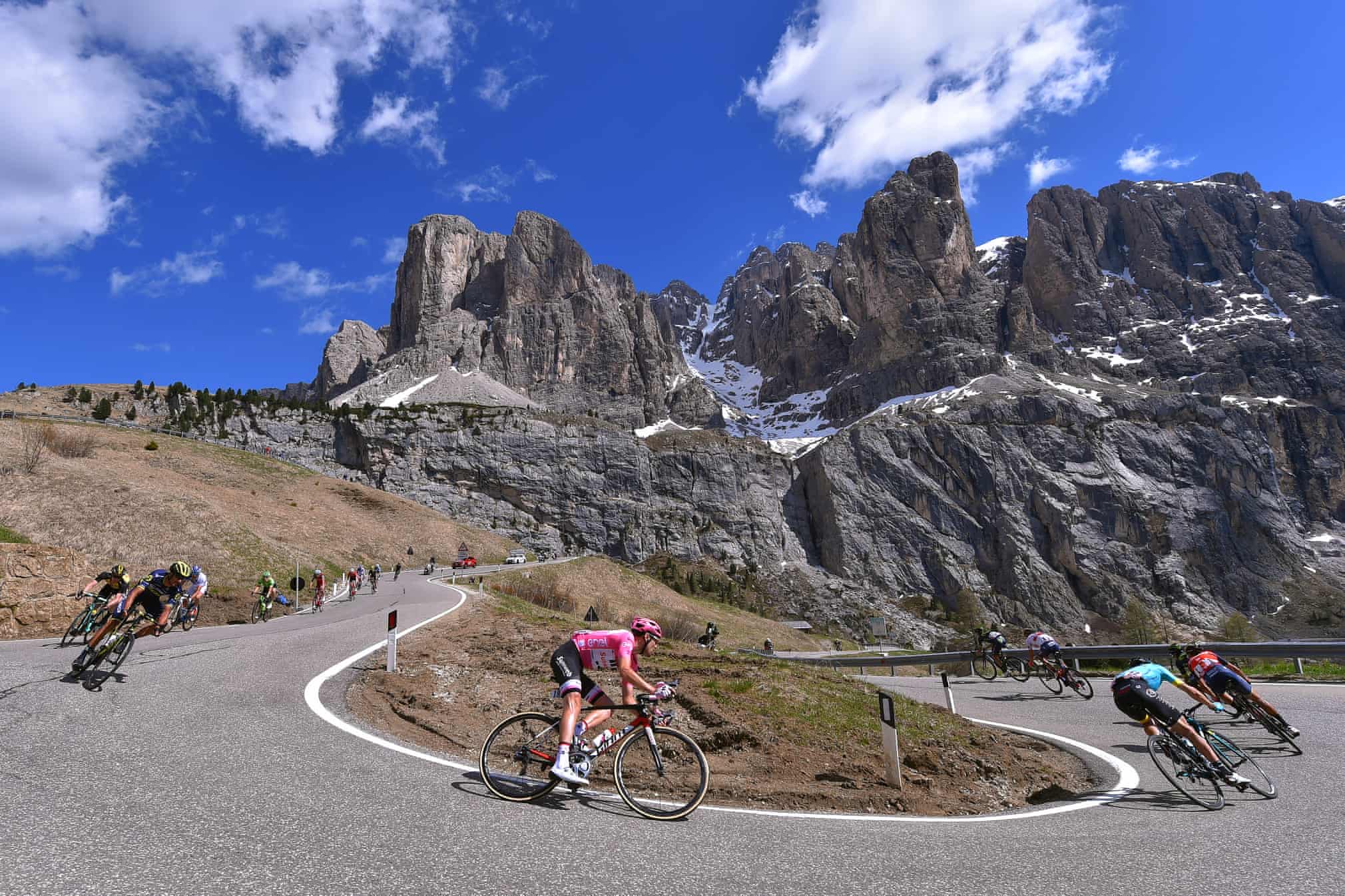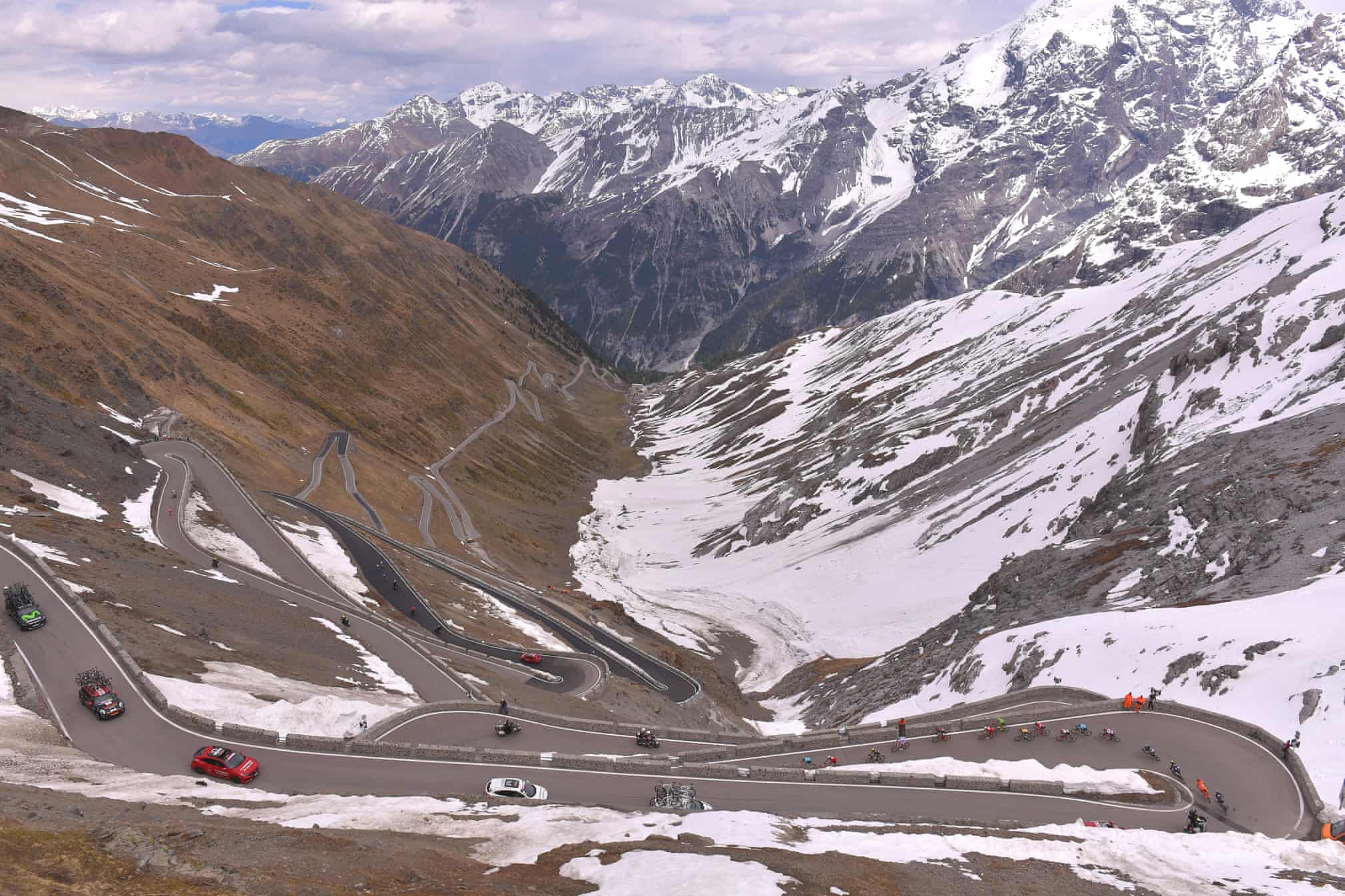Paying for a pedal-wash

Stage 18 of the 2017 Giro d’Italia, from Moena to Ortisei/St. Ulrich in the Dolomites, northern Italy. The next, 101st, edition of the Giro d’Italia will be the first Grand Tour race to start outside Europe. Photo by Tim de Waele/Corbis via Getty Images. More stunning photos at Giro d’Italia 2017
Giro d’Italia’s start in Israel provokes accusations of ‘sport-washing’
La grande partenza in Jerusalem will be a historic first but brings an unprecedented level of political controversy to cycling’s second biggest event
By Richard Abraham, The Observer
September 24, 2017
Israel is a country of builders. Almost 70 years after its foundation skycrapers jostle for space along the Mediterranean strand, planted in the fertile soil of a Tel Aviv property boom. Up in the Judean Hills, other kinds of structures – architectures of military control in the occupied Palestinian territories – spring up, too.
Israelis are now turning their attention to a new kind of construction: image. Despite the occupation and condemnation from the international community, Israel is ready to project its pride at what it has built and paint over the canvas of conflict. Holding the brush is Sylvan Adams, an ebullient 58-year-old property billionaire who emigrated from Canada in 2016.

Sylvan Adams’ Facebook pic. More on the billionaire’s business at Quebec billionaire Sylvan Adams moves to Israel
“‘Normal Israel’ is the phrase that I’ve coined; it’s the regular daily life which somehow is not an interesting enough story to be told to the rest of the world. All they want to do is talk about conflict and terrorism but that’s a very, very small part of life in Israel,” he says.
Adams’s subject is cosmopolitan Israel: a charming country of ancient heritage and modern cities, of warm seas and warm people. Next May his chosen colour will be pink, synonymous with the Giro d’Italia, in his position as honorary president of the organising committee of the race’s ‘Big Start’ in Jerusalem.
The three-week Giro is widely considered the most beautiful of cycling’s three Grand Tours, ahead of the sporting leviathan of the Tour de France and the lower-key Vuelta a España. Ministers from Israel and Italy gathered in the glitzy ballroom of Jerusalem’s Waldorf Astoria last week to confirm that the opening three stages of next year’s Giro will take place in Israel: the first time a Grand Tour will start outside Europe.
With an opening 10.1km individual time trial in Jerusalem on 4 May followed by two flat road stages traversing the country, the race will break no sporting ground. Yet by showcasing Israel amid cultural and artistic boycotts, the 2018 Giro’s grande partenza brings an unprecedented level of political controversy to cycling’s second biggest event.
The matching of cycle race and overseas host goes back to 1954 when the Tour de France began in Amsterdam. The Giro followed in 1965 with a visit to San Marino and has since been as far afield as Greece, Denmark and Northern Ireland. Today hosts pay tens of millions of Euros for television cameras to focus in on cherry-picked landscapes and historic monuments. Race organisers revel in the razzmatazz of a novel location that is prepared to pay the hefty fee.
Starting the Giro in Israel rewards it for its human rights abuses against the Palestinian people, including athletes
Sharaf Qutaifan
After this year’s centenary extravaganza held entirely in Italy, the Giro is looking to its new, global era. With talk of starts in the United States and Japan bubbling away, Israel, a country with no cycle racing heritage, came calling. “Israel wasn’t European and that was the deal breaker,” said the Giro’s race director, Mauro Vegni. “It was a unique opportunity that was too big to turn down.” Normal Israelis will enjoy their country’s first ever international cycling race, free-to-watch and surrounded by festivities. The frustration felt by Jerusalem’s Israeli shopkeepers towards the city’s sports-mad mayor, Nir Barkat, will subside when they count the tourist shekels in their coffers.
The Giro’s Italian owners, RCS Media Group, have won a rare first ahead of the French behemoth, Amaury Sports Organisation (ASO), which counts the Tour and the Vuelta in its commercial monopoly on the sport. The state of Israel has purchased a televisual picture postcard with the words “wish you were here” written on the back for an estimated €17m, a fraction of the cost of other major sporting events even when the bills for the vast security operation come in.
Sports and culture minister Miri Regev speaking at the press conference announcing the Jerusalem start to the race, September 18, 2017. Sylvan Adams, 2nd left of the seated men, said “This is a project about Zionism it will allow us to show the country. How else could we dream about having so many people come and see our normal Israel, the Israel they don’t necessarily read about every day in the newspaper.” Jerusalem major Nir Barkat, seated on Adams’ left, said “Our message to the world is clear: Jerusalem, the capital of the State of Israel, is open to all.” Photo by AFP
“Obviously Israel’s image in the news isn’t great; people think of it as a war zone, a desert, camel country, you name it,” said Ran Margaliot, Israel’s first professional cyclist and now manager of the Israel Cycling Academy, the country’s first professional team. “I want to believe that we can change people’s opinion about what our country stands for.”
Backed by two wealthy Israelis – including Adams, who is also funding the construction of the Middle East’s first Olympic velodrome, to open in Tel Aviv next May – the Israeli team is all but guaranteed to receive one of four wildcard invitations for the race.
Israel’s first Grand Tour rider will roll off the start ramp in Jerusalem, possibly alongside a Muslim Turkish team-mate Ahmet Örken, a highly politicised signing that could lead to his becoming his country’s first Grand Tour rider, too. It is a masterstroke of “soft diplomacy”.
Cycling, swamped by its own problems over the misuse of drugs, has never been very good at confronting geo-political dilemmas but it could not brush this one under the carpet. Organisers had to secure the participation of two top-tier cycling teams sponsored by Bahrain and the United Arab Emirates; teams mandated to ride by the sport’s rules but whose sponsoring states have frosty diplomatic relations with Israel. Route planners were careful to take the race well within internationally recognised borders, steering clear of the West Bank, Gaza and Jerusalem’s Old City.

The descent in Stage 18 – riders must navigate the legendary hairpins of the Stelvio Pass’s northern side after taking on the mountain from the south, on a 21.7km long ascent which has an average gradient of 7.1%. Photo by Tim de Waele/Corbis via Getty Images. More stunning photos at Giro d’Italia
Yet calls for a boycott will remain until next May, with the Boycott, Divestment, Sanctions (BDS) movement claiming the event represents a “sports-washing of Israel’s occupation and apartheid”.
“Starting the Giro in Israel to all intents rewards Israel for its decades-long human rights abuses against the Palestinian people, including athletes,” says Sharaf Qutaifan of the Palestinian Campaign for the Academic and Cultural Boycott of Israel.
Organisers and ministers from here and Italy responded in unison that they would be in Israel to “do sport, not politics”, but as they huddled together behind the Giro’s Trofeo Senza Fine, the trophy without end, the absence of Palestinian faces in the room laid the politics of this event bare.
No amount of pomp, pink and “Normal Israel” can hide it.

